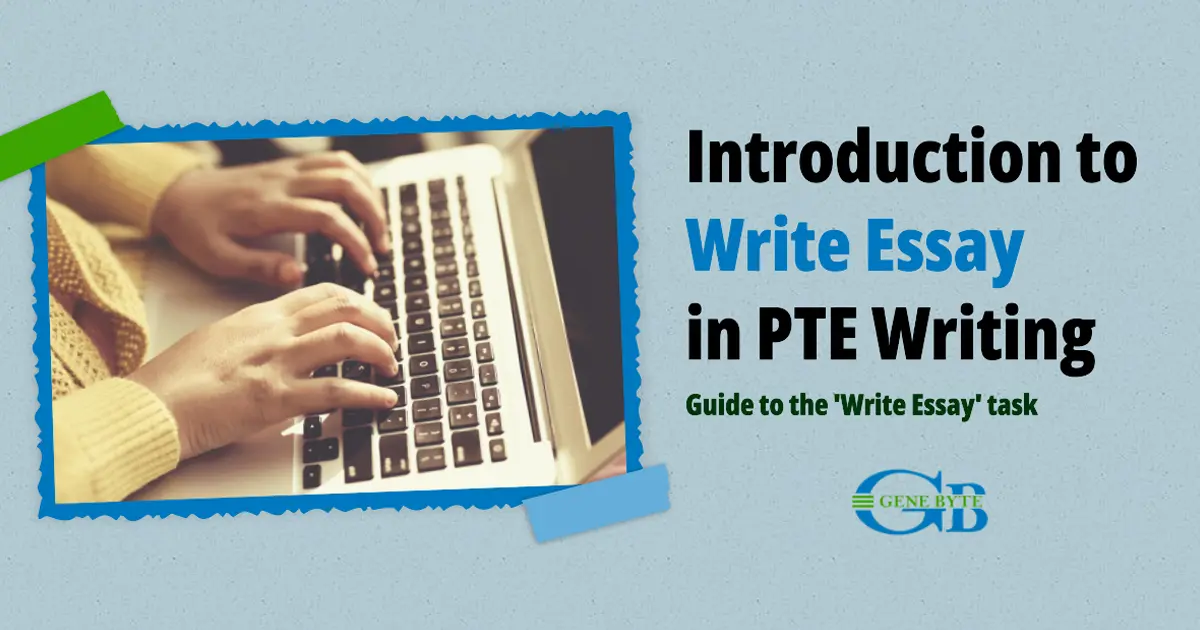Master the art of argumentative essays in PTE Academic with Genebyte's innovative solutions.
Educators are essential in helping students tackle the Write Essay task of the PTE Academic Writing Section, a challenging part that tests more than basic writing skills. This task requires students to craft a 200-300 word essay that showcases their argumentative and analytical abilities.
Key Takeaways
- Task Complexity: Students must write a coherent essay on a given topic within a limited time, testing their language skills and ability to structure arguments.
- Skills Emphasis: Focus on enhancing students' ability to construct persuasive, well-organized essays.
- Understanding Criteria: Teach the specific scoring criteria of the PTE Academic to help students meet exam expectations.
- Navigating Challenges: Address common issues like time management and effective thought organization.
By fully understanding and teaching these aspects, educators can better prepare their students for success in the Write Essay task, turning it into an opportunity to demonstrate true language proficiency and critical thinking.

Introduction to the Write Essay Task in PTE Academic
Overview of the Write Essay Question-type
The Write Essay question-type acts as a fundamental assessment of a candidate's ability to articulate ideas in written form. This task involves writing a 200-300 word essay based on a given prompt, which typically comprises 2-3 sentences. This exercise tests not just the writing skills but also the candidate's ability to organize thoughts, present arguments, and use language effectively within a constrained timeframe of 20 minutes. In the context of PTE Academic, this task stands as a comprehensive measure of a student's readiness for academic pursuits in an English-speaking environment. And if we talk about the PTE Core exam for applications to Canada visa, this task has been replaced with 'Write Email' task.
Importance in PTE Academic
Understanding the Write Essay task is crucial for educators as it directly impacts a student's success in the PTE Academic test. This task is not only about writing proficiency but also reflects a student's ability to think critically and express ideas coherently. The essay scores contribute significantly to the overall writing score, influencing the chances of students in their academic or immigration endeavors. Hence, as educators, mastering the nuances of this task and effectively imparting this knowledge becomes a key component in the preparatory journey of students.
Skills Assessed
The Write Essay task assesses a range of skills that are pivotal in academic writing:
- Content and Relevance: Ability to stay on topic and address the prompt effectively.
- Organization and Structure: Skill in organizing ideas logically with clear introductions, body paragraphs, and conclusions.
- Language Proficiency: Usage of appropriate vocabulary and grammar.
- Argumentation: Developing and supporting arguments with examples and explanations.
At Genebyte, we understand the importance of this task and offer a tailored solution that aids educators in enhancing their students' essay writing abilities. Our AI-driven platforms provide interactive tools and resources, enabling educators to offer personalized guidance and feedback. With Genebyte's technology, coaching institutes can track student progress, identify areas for improvement, and ensure that their students are well-prepared for this critical component of the PTE Academic exam.

Understanding the Task Requirements for Write Essay in PTE Academic
Essay Length and Time Allocation
The Write Essay task in PTE Academic comes immediately after the Summarize Written Text task, and requires candidates to compose an essay within a specific word limit and time frame. The key parameters are:
- Word Count: The essay must be between 200 to 300 words.
- Time Limit: Candidates have 20 minutes to plan, write, and revise their essay.
This structure demands efficient time management and concise writing skills, as candidates must express their ideas within these constraints.
Prompt Analysis: Types and Structure
Understanding the prompt is crucial for success in the Write Essay task. The prompts generally consist of:
- Length: Typically 2-3 sentences.
- Content: They can vary from argumentative to descriptive, requiring different approaches.
- Analysis Required: Candidates need to quickly identify the key topic, the type of response needed (agreement/disagreement, discussion), and the main points to cover.
Genebyte's B2B SaaS Solution for Educators
Genebyte's platform provides innovative tools to help educators train students in mastering these task requirements. Our solution offers:
- Interactive Writing Simulations: Mimicking real exam conditions, these simulations help students practice writing within the specified word count and time limit.
- Prompt Analysis Tools: Interactive features that assist in breaking down and understanding various prompt types.
- Progress Tracking: Monitoring student progress in handling different prompt types and managing time effectively.
Real-Life Example:
A coaching institute by the name of Spread The Wings Academy, using Genebyte's platform observed a significant improvement in students' ability to adhere to word limits and manage time efficiently. By leveraging our AI-driven analytics, educators could pinpoint areas where students struggled with prompt analysis and offer targeted guidance.

Scoring Criteria for Write Essay in PTE Academic
Content and Relevance to the Topic
In the Write Essay task of PTE Academic, the first and foremost criterion for scoring is the content's relevance to the given prompt. The essay must:
- Address all aspects of the prompt.
- Provide appropriate details, examples, and explanations supporting the viewpoint.
- Stay on topic throughout the essay.
A response that deviates from the topic receives no score, emphasizing the need for precise adherence to the prompt.
Development, Structure, and Coherence
This criterion assesses:
- Logical organization of the essay.
- The clarity of introduction, body, and conclusion in relation to the topic.
- Coherence in connecting ideas and paragraphs.
- Effective use of multiple paragraphs with clear transitions.
Essays that exhibit a well-structured and coherent flow of ideas score higher in this category.
Grammar, Vocabulary, and Spelling
Key components under this criterion include:
- Correct and varied sentence structures.
- Appropriate and diverse vocabulary suited for an academic setting.
- Accurate grammar usage.
- Consistent spelling following a single convention (US, UK, Australian, or Canadian English).
Mastery in these areas reflects a candidate's proficiency in written English, crucial for academic success.
General Linguistic Range and Form
This aspect evaluates:
- The ability to convey ideas using precise language.
- The range and accuracy of grammar and vocabulary.
- The essay's adherence to the 200-300 word requirement.
Essays that effectively use complex language structures and a wide range of vocabulary receive higher scores.

The Role of Templates and Tricks in Write Essay
Appropriateness of Using Templates in Write Essay
As with the Summarize Spoken Text task, templates can be a powerful tool in the Write Essay task too. They serve as a framework to structure thoughts and ideas efficiently. However, it's crucial to use them judiciously:
- Flexibility: Templates should be adaptable to different prompts and not restrict the natural flow of ideas.
- Personalization: Encourage students to modify templates to fit their writing style and the specific essay prompt.
- Avoid Over-reliance: While templates provide structure, relying solely on them can lead to mechanical and uninspired essays.
Strategies for Effective Essay Writing
Effective essay writing in PTE Academic goes beyond the mere use of templates. It involves:
- Understanding the Prompt: Teach students to analyze and understand the essay prompt thoroughly before starting.
- Brainstorming and Planning: Encourage brainstorming ideas and plan the essay structure in the initial minutes.
- Balanced Argumentation: Guide students to present balanced arguments, especially in opinion-based essays.
- Conciseness and Clarity: Focus on writing concise, clear sentences to convey ideas effectively within the word limit.
Real-Life Example
A coaching institute leveraging Genebyte's platform saw remarkable improvement in their students' essay writing skills. The use of customizable templates and AI-driven feedback helped students write more structured, coherent essays, significantly improving their scores in the Write Essay task.

Common Challenges in Write Essay
Addressing the Topic Fully
One of the primary challenges in the Write Essay task is ensuring that the response fully addresses the given topic. Students often struggle with:
- Staying On-Topic: Veering off-topic can significantly impact scores.
- Covering All Aspects: The essay should comprehensively address all elements of the prompt.
Maintaining Coherence and Structure
Another key challenge is maintaining a coherent structure throughout the essay. This includes:
- Logical Flow: Ideas should be organized logically, leading smoothly from one to the next.
- Paragraph Structure: Effective use of paragraphs to separate different ideas or arguments.
Balancing Content within Word Limits
Balancing the essay content within the 200-300 word limit can be tricky. Students need to:
- Be Concise: Express ideas succinctly without unnecessary elaboration.
- Be Comprehensive: Ensure all critical points are covered within the word limit.
Real-Life Example
An example of Genebyte's effectiveness is seen in a coaching institute where students, initially struggling with essay coherence and brevity, significantly improved their writing by utilizing our platform's structured guides and real-time word count tools.

Educator's Perspective - Guiding Students in Write Essay
Teaching Strategies for Essay Writing
As educators, guiding students through the Write Essay task in PTE Academic involves a multifaceted approach:
- Understanding the Prompt: Teaching students to thoroughly analyze the essay prompt for a clear understanding of what is being asked.
- Structured Approach: Introducing structured methods for essay writing, including brainstorming, outlining, and drafting.
- Emphasis on Clarity and Cohesion: Focusing on the importance of clear, concise, and cohesive writing.
Focusing on Critical Thinking and Argumentation
Encouraging critical thinking and effective argumentation is essential. This includes:
- Developing Arguments: Teaching how to construct well-reasoned arguments supported by evidence.
- Balancing Perspectives: Encouraging students to consider multiple viewpoints and present a balanced argument.
Importance of Practice and Feedback
Regular practice and constructive feedback are crucial for mastering essay writing:
- Practice Sessions: Incorporating frequent essay writing practice in the curriculum.
- Feedback Mechanism: Providing detailed feedback on essays to help students understand their strengths and areas for improvement.
Genebyte's B2B SaaS Solution: Enhancing Essay Writing Skills
Genebyte's platform offers unique advantages to educators in teaching essay writing:
- Customizable Essay Templates: An extensive collection of essay prompts for diverse practice.
- Interactive Feedback Tools: AI-driven tools that provide instant feedback on student essays.
- Progress Tracking: Monitoring student improvements over time.

Actionable Tips for Write Essay in PTE Academic
Recommendations for Educators:
- Develop Analytical Skills: Encourage students to analyze various essay prompts to understand different expectations.
- Practice Structured Writing: Regularly assign essays to practice structured writing within the word limit.
- Enhance Argumentation Skills: Conduct debates or discussions to improve students' argumentation skills.
- Feedback Sessions: Hold regular sessions to provide personalized feedback on students' essays.
Actionable Steps with Genebyte:
- Explore Genebyte's Platform: Familiarize yourself with the tools and resources available.
- Incorporate into Curriculum: Integrate Genebyte's exercises and feedback mechanisms into your teaching plan.
- Monitor Progress: Use Genebyte's analytics to track and improve students' essay writing skills.
Incorporating Genebyte's B2B SaaS Solution:
- Customized Essay Exercises: To practice various types of essay prompts.
- Real-time Feedback: For immediate improvement suggestions.
- Progress Monitoring Tools: To track students' development over time.
Mastering the Write Essay task in PTE Academic is pivotal for students aiming to excel in their language proficiency assessments. After this task students can move to Reading and Writing: Fill in the Blanks, the first question of the Reading section. For educators, understanding these challenges and employing effective teaching strategies is key to guiding students to success.
Discover how Genebyte can revolutionize your teaching methods and optimize your students' learning outcomes. Explore our platform today and take the first step towards educational excellence in PTE Academic preparation.
Frequently Asked Questions
Write Essay in PTE refers to a task where candidates are required to write a 200–300 word argumentative essay on a given topic within a 20-minute time frame. This task assesses the candidate's writing skills, including their ability to develop an argument, structure their response coherently, and use appropriate language.
The format involves writing an argumentative essay of 200–300 words based on a prompt, which typically consists of 2–3 sentences. The task focuses on assessing the candidate's writing skills within a limited timeframe.
Candidates are allocated 20 minutes to plan, write, and revise their essay in the PTE Write Essay task.
The essay should be between 200 and 300 words. Essays shorter than 200 words or longer than 300 words can lead to a decrease in score.
An example prompt could be: 'Discuss the impact of technology on education.' Candidates would then need to write an essay discussing this topic, providing arguments, examples, and reasoning within the word limit.
Scoring is based on several factors including content relevance, development, structure, coherence, linguistic range, grammar, vocabulary, and spelling. Each factor is evaluated to determine the candidate's proficiency in writing an academic essay.
Criteria include content adequacy, essay structure and coherence, form, general linguistic range, grammar usage, vocabulary range, and spelling. These criteria collectively assess the quality and effectiveness of the essay.
The Write Essay task is scored on a scale of 0 to 3 for each of seven factors, with partial credit scoring applied. The total score is a composite of these individual factors.
PTE primarily requires argumentative essays where candidates express their viewpoint on a given topic, supported by reasons and examples.
Yes, the essay should be structured with an introduction, body paragraphs, and a conclusion, staying within the 200-300 word limit.
Rules include writing within the word limit, adhering to the prompt, using appropriate language and structure, and avoiding plagiarism.
Typically, there is one Write Essay task in a PTE Academic exam.
Yes, the PTE Write Essay interface includes cut, copy, and paste functions to aid in essay composition.
Skills assessed include writing for a purpose, supporting opinions, organizing ideas logically, using appropriate language, grammar, and spelling, and writing under timed conditions.
Templates can be effective for structuring essays but should be used flexibly and adapted to fit the specific prompt.
Time management best practices include spending a few minutes planning, around 14 minutes writing, and the remaining time reviewing the essay for errors and coherence.
Educators should focus on teaching students how to analyze prompts, structure their essays effectively, develop arguments, and practice regularly with feedback.
Common challenges include staying on topic, maintaining essay coherence, and adhering to the word limit. Overcoming these involves practice, understanding the prompt correctly, and developing structured writing skills.
Genebyte's platform offers tools like customizable essay prompts, real-time feedback mechanisms, and progress tracking features that enhance the learning and teaching experience in essay writing for PTE.
Coherence and structure significantly impact scores. Essays with clear, logical organization and smooth transitions between ideas typically score higher.
